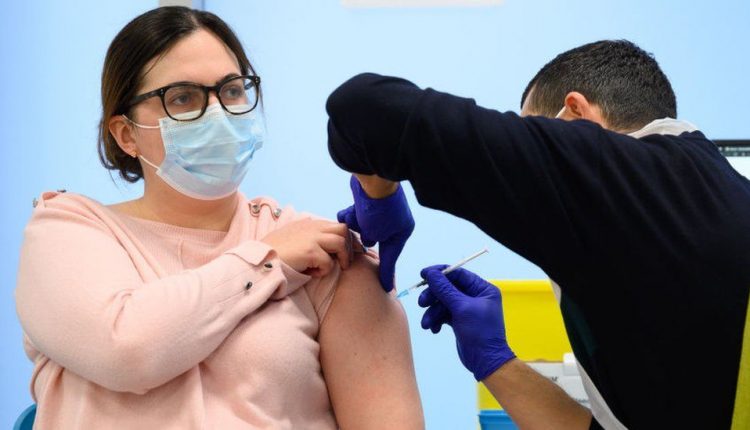Covid booster: Hospitals and pharmacies urged to ramp up rollout
NHS England is to issue detailed guidance to hospitals, pharmacists and GPs about the major expansion of the Covid booster vaccine programme.
Hospital hubs will be asked to offer jabs to the public as well as NHS staff and more pharmacies will be used.
The government is aiming to offer all eligible adults in England a booster jab by the end of January in response to the new Omicron variant.
People will be invited to book a third dose three months after their second.
On Tuesday the prime minister said booster doses would be given at 1,500 community pharmacy sites and extra hospital hubs in England – and that 400 military personnel would also be on hand to help with the rollout.
Previously hospital hubs had largely focused on vaccinating NHS and care staff but they will now be asked to deliver jabs to the general public.
About 50 mass vaccination centres have closed in England since the beginning of the vaccination programme.
And many GPs have stopped delivering Covid vaccines to focus on other patients and flu jabs.
- When can I get my booster jab?
- What Covid rules are being toughened?
- Can the NHS boost the booster programme?
“If they want us to be involved in a Covid booster campaign then
of course something has to give.”
Northern Ireland has also announced extra vaccination clinics to meet demand. Scotland and Wales have said their booster programmes will be ramped up, but are yet to lay out the full details.
But health leaders have warned that expanding the booster rollout poses a big challenge. Matthew Taylor, chief executive of the NHS Confederation, which represents the healthcare system in England, Wales and Northern Ireland, said accelerating the booster rollout would have “consequences” for a health service which was already stretched.
“We need to be realistic about what the health service is going to be able to do when it is prioritising these booster programmes,” he added.
The doctors’ union, the BMA, warned GPs were already working extra hours and would struggle to maintain their existing workload if they were required to help roll out boosters.
Dr Phil White, from the BMA’s GP Committee in Wales, said: “If they want us to be involved in a Covid booster campaign then of course something has to give.”
Saffron Cordery, deputy chief executive of NHS Providers, which represents NHS trusts, said the January target was “a huge logistical challenge” for the health service but ramping up the booster rollout was “absolutely the right thing to do”.
A total of 22 cases of Omicron have been confirmed in the UK so far – 13 in England and nine cases in Scotland linked to a single event.
First Minister Nicola Sturgeon said none of the individuals infected with the new variant in Scotland had needed hospital treatment.
There are fears that Omicron may spread more quickly and could make vaccines less effective, while the World Health Organization says there is a higher risk of reinfection than with other variants.
Government scientists have said the impact of the variant on the UK is “highly uncertain” but it may require a “very stringent response” to avoid unsustainable pressure on the NHS.
In leaked minutes of a meeting of the Scientific Advisory Group for Emergencies held on Monday, seen by the BBC, the group say it is “highly likely” Omicron can escape immunity caused by previous infection or vaccination “to some extent” – and that officials should prepare now for a “potentially significant” wave of infections.
Christmas socialising
On Tuesday, Dr Jenny Harries, the head of the UK Health Security Agency – the body which replaced Public Health England – suggested people should limit unnecessary socialising in the run-up to Christmas to keep the variant at bay.
But the prime minister disagreed, saying government guidance remains the same – but that people should “take sensible precautions” like washing hands and wearing masks.
He also urged people not to cancel Christmas parties and nativity plays, adding that the government was taking a “balanced and proportionate” approach.

Around 18 million people in the UK have already had a booster jab, with a total of 318,671 administered on Monday.
Since the rollout was expanded, another 14 million adults in England have become eligible for a booster in England alone, Mr Johnson said.
People have been told to wait to be contacted by the NHS before booking their booster, with individuals prioritised by age and the NHS working down the list in five-year age bands.
As well as extending the booster rollout, Covid restrictions have also been strengthened in response to the Omicron variant.
Face coverings are once again compulsory in places like shops and on public transport in England, and contacts of suspected Omicron cases are now required to self-isolate for 10 days, regardless of their vaccination status.
And as of Tuesday morning, anyone coming to the UK must self-isolate until they get a negative result from a PCR test, taken within 48 hours of arrival.
A further 39,716 Covid cases were reported in the UK on Tuesday, as well as another 159 deaths within 28 days of a positive test.


Comments are closed.